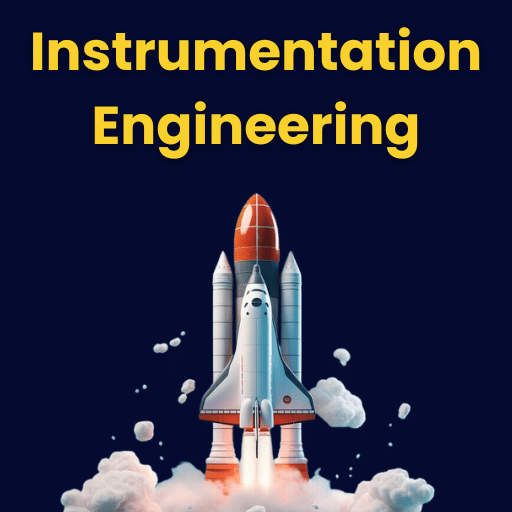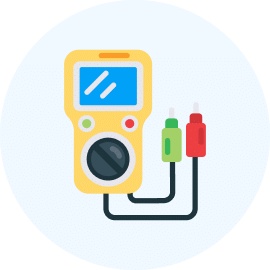
|
PARTNER COURSE
Crash Course for GATE Instrumentation EngineeringGate Gurus · Last updated on Oct 14, 2025 |
Crash Course for GATE Instrumentation Engineering Study Material
Trending Courses for GATE Instrumentation
Crash Course for GATE Instrumentation Engineering Exam Pattern 2025-2026
Crash Course for GATE Instrumentation Engineering Exam Pattern
The GATE (Graduate Aptitude Test in Engineering) Instrumentation Engineering exam is a crucial assessment for aspiring engineers in the field of instrumentation. Understanding the exam pattern is essential for effective preparation. Here’s a detailed breakdown of the exam pattern.
1. Exam Format
The GATE Instrumentation Engineering exam consists of two main formats:
- Multiple Choice Questions (MCQs): These questions have four choices, with only one correct answer. They test the fundamental concepts and knowledge.
- Numerical Answer Questions: These questions require candidates to solve problems and enter a numerical value as the answer. They assess analytical and problem-solving skills.
2. Total Number of Questions
The exam typically comprises:
- 65 Questions: A total of 65 questions, which include both MCQs and Numerical Answer Questions.
- General Aptitude: Approximately 15% of the total questions focus on General Aptitude, covering verbal and numerical ability.
3. Marking Scheme
The marking scheme is as follows:
- Marks per Question: MCQs are generally worth 1 or 2 marks each, while Numerical Answer Questions usually carry 1 or 2 marks.
- Negative Marking: For MCQs, there is a penalty of 1/3 mark for incorrect answers to 1-mark questions and 2/3 mark for 2-mark questions. There is no negative marking for Numerical Answer Questions.
4. Duration of the Exam
The total duration of the GATE exam is:
- 3 Hours: Candidates are given 3 hours to complete the examination, which requires effective time management.
5. Subjects Covered
The syllabus for GATE Instrumentation Engineering includes various topics such as:
- Instrumentation: Measurement and control systems, transducers, and sensors.
- Control Systems: Feedback and stability analysis.
- Signal Processing: Digital and analog signal processing.
- Electrical and Electronics Engineering: Circuit theory, signals, and systems.
6. Preparation Tips
Here are some key tips for effective preparation:
- Understand the Syllabus: Familiarize yourself with the complete syllabus and focus on the important topics.
- Practice Previous Year Papers: Solve previous years' GATE papers to understand the question pattern and difficulty level.
- Time Management: Practice managing your time effectively during the exam to ensure you can attempt all questions.
In conclusion, understanding the exam pattern of GATE Instrumentation Engineering is crucial for effective preparation. By familiarizing yourself with the format, marking scheme, and subjects covered, you can develop a strategic study plan to maximize your chances of success.
Crash Course for GATE Instrumentation Engineering Syllabus 2025-2026 PDF Download
GATE Instrumentation Crash Course
The GATE Instrumentation Crash Course is designed to provide a comprehensive understanding of the key topics in Instrumentation Engineering. This course focuses on essential concepts, problem-solving techniques, and tips to excel in the GATE exam.
GATE Instrumentation Engineering Mathematics
- Linear Algebra: Matrix theory, Eigenvalues and Eigenvectors.
- Probability and Statistics: Mean, variance, standard deviation, distributions.
- Calculus: Differentiation, integration, partial derivatives, and applications.
- Differential Equations: Ordinary and partial differential equations.
GATE Instrumentation Electricity and Magnetism
- Electrostatics: Coulomb's law, electric field, potential, and capacitance.
- Magnetostatics: Magnetic fields, Ampere’s law, and magnetic materials.
- Electromagnetic Induction: Faraday’s laws, inductance, and transformers.
- AC Circuits: Phasors, impedance, resonance, and power in AC circuits.
GATE Instrumentation Electrical Circuits and Machines
- Circuit Analysis: KVL, KCL, Thevenin’s theorem, and network theorems.
- DC Machines: Operating principles, characteristics, and applications.
- AC Machines: Synchronous and induction machines, performance analysis.
- Transformers: Types, working principles, and applications.
GATE Instrumentation Signals and Systems
- Signal Classification: Continuous vs. discrete, periodic vs. aperiodic.
- System Properties: Linearity, time-invariance, causality, stability.
- Transforms: Fourier, Laplace, and Z-transforms.
- Signal Processing: Filtering, convolution, and system response.
GATE Instrumentation Control Systems
- Control System Basics: Open-loop vs. closed-loop systems.
- Transfer Functions: Derivation and analysis.
- Stability Analysis: Routh-Hurwitz criterion, Nyquist and Bode plots.
- PID Controllers: Design and tuning methods.
GATE Instrumentation Analog Electronics
- Semiconductor Basics: Diodes, transistors, and operational amplifiers.
- Analog Circuits: Amplifiers, oscillators, and filters.
- Feedback Systems: Positive and negative feedback, stability analysis.
- Applications: Signal conditioning and data acquisition.
GATE Instrumentation Digital Electronics
- Digital Logic: Boolean algebra, logic gates, and minimization techniques.
- Combinational Circuits: Multiplexers, demultiplexers, and encoders.
- Sequential Circuits: Flip-flops, counters, and state machines.
- Microcontrollers: Architecture, programming, and interfacing.
GATE Instrumentation Measurements
- Measurement Fundamentals: Types of errors, calibration, and standards.
- Measuring Instruments: Analog vs. digital, measuring ranges.
- Data Acquisition Systems: Components and operation.
- Signal Conditioning: Amplifiers, filters, and multiplexers.
GATE Instrumentation Sensors and Industrial Instrumentation
- Sensor Basics: Types of sensors, working principles, and applications.
- Industrial Instrumentation: Process variables, control loops, and instrumentation systems.
- Transducers: Characteristics, classification, and applications.
- Calibration Techniques: Methods and importance in industrial settings.
GATE Instrumentation Communication and Optical Instrumentation
- Communication Systems: Modulation techniques, signal transmission.
- Optical Instruments: Lasers, fiber optics, and their applications.
- Data Communication: Protocols, networks, and standards.
- Wireless Communication: Principles and technologies.
This detailed syllabus for the GATE Instrumentation Crash Course encapsulates all the vital topics necessary for success in the GATE Instrumentation examination. Mastery of these subjects will equip candidates with the knowledge and skills needed to excel.
This course is helpful for the following exams: GATE Instrumentation
How to Prepare Crash Course for GATE Instrumentation Engineering?
How to Prepare Crash Course for GATE Instrumentation Engineering for GATE Instrumentation?
Preparing for the GATE Instrumentation exam can be a daunting task, but with a well-structured Crash Course for GATE Instrumentation Engineering from EduRev, you can streamline your study process. Here are key strategies to effectively prepare for the exam.
1. Understand the GATE Instrumentation Syllabus
It is essential to have a clear understanding of the GATE Instrumentation syllabus. Focus on the core subjects such as:
- Instrumentation
- Control Systems
- Electrical and Electronics Engineering
- Signal Processing
Familiarizing yourself with the syllabus will help you prioritize topics during your Crash Course for GATE Instrumentation Engineering preparation.
2. Create a Study Plan
A structured study plan is crucial. Allocate time for each subject in the Crash Course for GATE Instrumentation Engineering. Make sure to include:
- Daily Study Goals
- Weekly Progress Checks
- Revision Sessions
This approach ensures comprehensive coverage of all topics essential for GATE Instrumentation.
3. Leverage Quality Study Material
Utilize the resources provided in the Crash Course for GATE Instrumentation Engineering. Key materials include:
- Lecture Videos
- Practice Questions
- Mock Tests
These resources are designed to enhance understanding and retention of concepts.
4. Focus on Problem-Solving Skills
GATE Instrumentation exam emphasizes practical problem-solving. Engage in:
- Sample Problems
- Previous Year Question Papers
- Timed Quizzes
Regular practice will help you tackle the exam confidently.
5. Join Discussion Forums
Engage with peers through discussion forums. Sharing knowledge and solving doubts will enrich your learning experience. Look for forums related to GATE Instrumentation to connect with fellow aspirants.
6. Regular Revision
Revision is key to retaining information. Schedule regular revision sessions to go over previously studied material in your Crash Course for GATE Instrumentation Engineering. This practice will reinforce your knowledge and increase your confidence.
7. Stay Healthy and Manage Stress
Lastly, maintaining a healthy lifestyle is crucial during exam preparation. Ensure you:
- Get Adequate Sleep
- Exercise Regularly
- Practice Relaxation Techniques
A healthy body contributes to a focused mind, which is essential for successful preparation for GATE Instrumentation.
Conclusion
By following these strategies in your Crash Course for GATE Instrumentation Engineering, you can enhance your preparation and increase your chances of success in the GATE Instrumentation exam. Remember, consistency and dedication are key to achieving your goals!
This HTML-formatted content is designed to be visually appealing, with appropriate emphasis on headers and key points, while promoting the EduRev course effectively.
Importance of Crash Course for GATE Instrumentation Engineering
Importance of Crash Course for GATE Instrumentation Engineering Course
Preparing for the GATE (Graduate Aptitude Test in Engineering) exam, specifically in Instrumentation Engineering, can be a daunting task. A crash course can significantly streamline the preparation process, making it an invaluable resource for aspiring candidates. Below are some crucial reasons that highlight the importance of a crash course for GATE Instrumentation Engineering.
1. Comprehensive Coverage of Syllabus
A crash course is designed to cover the entire syllabus in a condensed timeframe, ensuring that students do not miss out on important topics. It includes:
- Key concepts and theories relevant to Instrumentation Engineering.
- Detailed discussions on core subjects like Control Systems, Sensors, and Transducers.
2. Expert Guidance
Crash courses are often led by experienced instructors who provide:
- Insights into complex topics and problem-solving techniques.
- Tips and tricks that can enhance understanding and retention.
3. Time Management Skills
One of the biggest challenges in GATE preparation is managing time effectively. A crash course aids students in:
- Developing a study schedule that maximizes productivity.
- Learning to prioritize topics based on their weightage in the exam.
4. Practice and Revision
These courses typically include extensive practice sessions that offer:
- A variety of problem sets that simulate the GATE exam environment.
- Regular revision sessions to reinforce learned material.
5. Boosting Confidence
A well-structured crash course helps in:
- Building confidence through mock tests and quizzes.
- Reducing anxiety by familiarizing students with the exam format and types of questions.
6. Networking Opportunities
Participating in a crash course can also facilitate:
- Interaction with peers who share similar goals, fostering a collaborative learning environment.
- Opportunities for discussion and knowledge sharing, which can enhance understanding.
7. Focus on Important Topics
Crash courses often highlight:
- High-yield topics that are frequently tested in the GATE exam.
- Strategies for tackling these areas effectively to maximize scoring potential.
Conclusion
In conclusion, a crash course for GATE Instrumentation Engineering is not just a preparatory tool; it is a comprehensive approach that equips students with the necessary skills, knowledge, and confidence to excel in their exams. By leveraging the resources provided in such courses, candidates can significantly improve their chances of securing a top rank in the GATE examination, making it a wise investment in their future.
Crash Course for GATE Instrumentation Engineering FAQs
| $1. What is the GATE exam and why is it important for Instrumentation Engineering students? |  |
| $2. What topics are generally covered in the GATE Instrumentation Engineering syllabus? |  |
| $3. How can I prepare effectively for the GATE Instrumentation Engineering exam? |  |
| $4. What are the eligibility criteria for appearing in the GATE exam for Instrumentation Engineering? |  |
| $5. What is the exam pattern for the GATE Instrumentation Engineering paper? |  |
| $6. How is the GATE score calculated? |  |
| $7. What resources are recommended for studying Instrumentation Engineering for GATE? |  |
| $8. Can you explain the concept of transducers and their significance in Instrumentation Engineering? |  |
| $9. What are some common types of sensors used in Instrumentation Engineering? |  |
| $10. How important is numerical ability and general aptitude in the GATE exam? |  |
| $11. Are there any negative markings in the GATE Instrumentation Engineering exam? |  |
| $12. What are the job opportunities available after qualifying GATE in Instrumentation Engineering? |  |
| $13. How can I manage my time effectively during the GATE exam? |  |
| $14. Is there any specific strategy to tackle the numerical answer type questions in GATE? |  |
| $15. What are some tips for revising before the GATE exam? |  |
Best Coaching for Crash Course for GATE Instrumentation Engineering
Tags related with Crash Course for GATE Instrumentation Engineering

|
View your Course Analysis |

|

|
Create your own Test |

|































